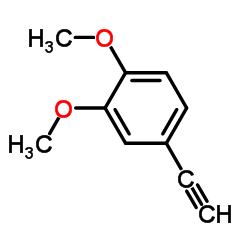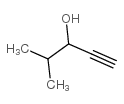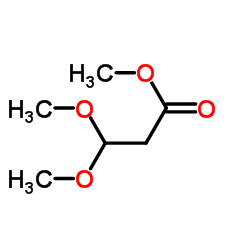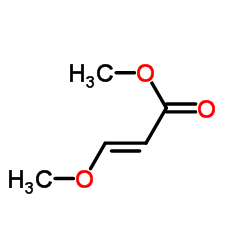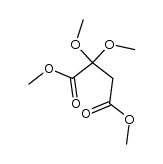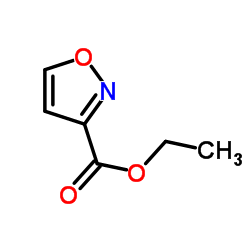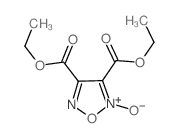1066-26-8
| 中文名 | 乙炔钠 |
|---|---|
| 英文名 | monosodium acetylide |
| 中文别名 |
乙醯化鈉
乙炔化钠 乙炔基 钠 |
| 英文别名 |
MFCD00008568
sodium,ethyne Sodium acetylide EINECS 213-908-9 |
| 密度 | 0,865 g/cm3 |
|---|---|
| 分子式 | C2HNa |
| 分子量 | 48.01910 |
| 闪点 | 85 °F |
| 精确质量 | 47.99760 |
| LogP | 0.12640 |
| 储存条件 | 在干爽的惰性气体下,保持容器密封,储存在阴凉,干燥的地方 |
| 稳定性 | 1.常温常压下稳定,避免氧化物 酸 水分接触 2.在潮湿空‘毛中缓慢地分解,在1大气压下加热至约150℃会彻底分解。 |
| 分子结构 | 1、摩尔折射率:无可用的 2、摩尔体积(cm3/mol):无可用的 3、等张比容(90.2K):无可用的 4、表面张力(dyne/cm):无可用的 5、介电常数:无可用的 6、极化率(10-24cm3):无可用的 7、单一同位素质量:47.997595 Da 8、标称质量:48 Da 9、平均质量:48.0191 Da |
| 计算化学 | 1.疏水参数计算参考值(XlogP):无 2.氢键供体数量:0 3.氢键受体数量:1 4.可旋转化学键数量:0 5.互变异构体数量:无 6.拓扑分子极性表面积0 7.重原子数量:3 8.表面电荷:0 9.复杂度:10.8 10.同位素原子数量:0 11.确定原子立构中心数量:0 12.不确定原子立构中心数量:0 13.确定化学键立构中心数量:0 14.不确定化学键立构中心数量:0 15.共价键单元数量:2 |
| 更多 | 1. 性状:自色或黄色松脆固体 2. 密度(g/cm3,20℃):0.865 3. 相对蒸汽密度(g/mL,空气=1):未确定 4. 熔点(ºC):未确定 5. 沸点(ºC,常压):未确定 6. 沸点(ºC,8mm):未确定 7. 折射率:未确定 8. 闪点(ºF):85 9. 比旋光度(º):未确定 10. 自燃点或引燃温度(ºC):未确定 11. 蒸气压(kPa,25ºC):未确定 12. 饱和蒸气压(kPa,60ºC):未确定 13. 燃烧热(KJ/mol):未确定 14. 临界温度(ºC):未确定 15. 临界压力(KPa):未确定 16. 油水(辛醇/水)分配系数的对数值:未确定 17. 爆炸上限(%,V/V):未确定 18. 爆炸下限(%,V/V):未确定 19. 溶解性:和水反应 |
Synonym:None Section 2 - COMPOSITION, INFORMATION ON INGREDIENTS
Risk Phrases: 10 14 20/21 38 Section 3 - HAZARDS IDENTIFICATION EMERGENCY OVERVIEW
Flammable. Reacts violently with water. Harmful by inhalation and in contact with skin. Irritating to skin.Air sensitive.Water-reactive. Potential Health Effects Eye: Causes eye irritation. When substance becomes wet or comes in contact with moisture of the mucous membranes, it will cause irritation. May cause chemical conjunctivitis and corneal damage. Skin: Causes skin irritation. Contact with skin causes irritation and possible burns, especially if the skin is wet or moist. May cause irritation and dermatitis. May cause cyanosis of the extremities. Ingestion: May cause gastrointestinal irritation with nausea, vomiting and diarrhea. The toxicological properties of this substance have not been fully investigated. Ingestion of large amounts may cause CNS depression. Inhalation: May cause irritation of the respiratory tract with burning pain in the nose and throat, coughing, wheezing, shortness of breath and pulmonary edema. The toxicological properties of this substance have not been fully investigated. Inhalation may be fatal as a result of spasm, inflammation, edema of the larynx and bronchi, chemical pneumonitis and pulmonary edema. Aspiration may lead to pulmonary edema. Vapors may cause dizziness or suffocation. May cause burning sensation in the chest. Chronic: No information found. Section 4 - FIRST AID MEASURES Eyes: Flush eyes with plenty of water for at least 15 minutes, occasionally lifting the upper and lower eyelids. Get medical aid. Skin: Get medical aid. Flush skin with plenty of water for at least 15 minutes while removing contaminated clothing and shoes. Wash clothing before reuse. If water-reactive products are embedded in the skin, no water should be applied. The embedded products should be covered with a light oil. Ingestion: Get medical aid. Do NOT induce vomiting. If conscious and alert, rinse mouth and drink 2-4 cupfuls of milk or water. Wash mouth out with water. Inhalation: Remove from exposure and move to fresh air immediately. If not breathing, give artificial respiration. If breathing is difficult, give oxygen. Get medical aid. Notes to Physician: Section 5 - FIRE FIGHTING MEASURES General Information: As in any fire, wear a self-contained breathing apparatus in pressure-demand, MSHA/NIOSH (approved or equivalent), and full protective gear. Vapors may form an explosive mixture with air. Vapors can travel to a source of ignition and flash back. During a fire, irritating and highly toxic gases may be generated by thermal decomposition or combustion. Will burn if involved in a fire. Water Reactive. Material will react with water and may release a flammable and/or toxic gas. Use water spray to keep fire-exposed containers cool. Containers may explode in the heat of a fire. Flammable liquid and vapor. May ignite or explode on contact with steam or moist air. Extinguishing Media: Use water spray to cool fire-exposed containers. Use foam, dry chemical, or carbon dioxide. DO NOT USE WATER! Contact professional fire-fighters immediately. Section 6 - ACCIDENTAL RELEASE MEASURES General Information: Use proper personal protective equipment as indicated in Section 8. Spills/Leaks: Absorb spill with inert material (e.g. vermiculite, sand or earth), then place in suitable container. Clean up spills immediately, observing precautions in the Protective Equipment section. Remove all sources of ignition. Use a spark-proof tool. Provide ventilation. Do not expose spill to water. Place under an inert atmosphere. A vapor suppressing foam may be used to reduce vapors. Section 7 - HANDLING and STORAGE Handling: Wash thoroughly after handling. Use with adequate ventilation. Do not allow water to get into the container because of violent reaction. Ground and bond containers when transferring material. Use spark-proof tools and explosion proof equipment. Avoid contact with eyes, skin, and clothing. Empty containers retain product residue, (liquid and/or vapor), and can be dangerous. Keep container tightly closed. Keep away from heat, sparks and flame. Avoid ingestion and inhalation. Handle under an inert atmosphere. Store protected from air. Do not allow contact with water. Do not pressurize, cut, weld, braze, solder, drill, grind, or expose empty containers to heat, sparks or open flames. Keep from contact with moist air and steam. Storage: Keep away from heat, sparks, and flame. Keep away from sources of ignition. Store in a tightly closed container. Store in a cool, dry, well-ventilated area away from incompatible substances. Keep away from water. Flammables-area. Do not expose to air. Store under an inert atmosphere. Section 8 - EXPOSURE CONTROLS, PERSONAL PROTECTION Engineering Controls: Use explosion-proof ventilation equipment. Facilities storing or utilizing this material should be equipped with an eyewash facility and a safety shower. Use adequate ventilation to keep airborne concentrations low. Exposure Limits CAS# 1066-26-8: CAS# 1330-20-7: United Kingdom, WEL - TWA: 50 ppm TWA; 220 mg/m3 TWA United Kingdom, WEL - STEL: 100 ppm STEL; 441 mg/m3 STEL United States OSHA: 100 ppm TWA; 435 mg/m3 TWA Belgium - TWA: 50 ppm VLE; 221 mg/m3 VLE Belgium - STEL: 150 ppm VLE; 442 mg/m3 VLE France - VME: 100 ppm VME; 435 mg/m3 VME France - VLE: 150 ppm VLE; 650 mg/m3 VLE Germany: 100 ppm TWA; 440 mg/m3 TWA Germany: Skin absorber Japan: 50 ppm OEL; 217 mg/m3 OEL Malaysia: 199 ppm TWA; 434 mg/m3 TWA Netherlands: 50 ppm MAC; 210 mg/m3 MAC Russia: 50 mg/m3 TWA Spain: 50 ppm VLA-ED; 221 mg/m3 VLA-ED Spain: 100 ppm VLA-EC; 442 mg/m3 VLA-EC CAS# 8012-95-1: United States OSHA: 5 mg/m3 TWA Belgium - TWA: 5 mg/m3 VLE Belgium - STEL: 10 mg/m3 VLE Japan: 3 mg/m3 OEL Malaysia: 5 mg/m3 TWA Netherlands: 5 mg/m3 MAC Russia: 5 mg/m3 TWA (mist) Spain: 5 mg/m3 VLA-ED Spain: 10 mg/m3 VLA-EC Personal Protective Equipment Eyes: Wear appropriate protective eyeglasses or chemical safety goggles as described by OSHA's eye and face protection regulations in 29 CFR 1910.133 or European Standard EN166. Skin: Wear appropriate protective gloves to prevent skin exposure. Clothing: Wear appropriate protective clothing to prevent skin exposure. Respirators: A respiratory protection program that meets OSHA's 29 CFR 1910.134 and ANSI Z88.2 requirements or European Standard EN 149 must be followed whenever workplace conditions warrant respirator use. Section 9 - PHYSICAL AND CHEMICAL PROPERTIES Physical State: Liquid Color: pale-yellow Odor: Not available. pH: Not available. Vapor Pressure: Not available. Viscosity: Not available. Boiling Point: Not available. Freezing/Melting Point: Not available. Autoignition Temperature: Not available. Flash Point: 29 deg C ( 84.20 deg F) Explosion Limits, lower: Not available. Explosion Limits, upper: Not available. Decomposition Temperature: Solubility in water: reacts Specific Gravity/Density: Molecular Formula: HC~2CNa Molecular Weight: 48.02 Section 10 - STABILITY AND REACTIVITY Chemical Stability: Combines vigorously or explosively with water. Conditions to Avoid: Incompatible materials, ignition sources, moisture, exposure to air, excess heat, exposure to moist air or water. Incompatibilities with Other Materials: Air, strong acids, strong bases, strong oxidizing agents, water. Hazardous Decomposition Products: Carbon monoxide, irritating and toxic fumes and gases, carbon dioxide. Hazardous Polymerization: Has not been reported Section 11 - TOXICOLOGICAL INFORMATION RTECS#: CAS# 1066-26-8 unlisted. CAS# 1330-20-7: ZE2100000 CAS# 8012-95-1: GZ8725550 PY8030000 XH7480000 LD50/LC50: Not available. CAS# 1330-20-7: Draize test, rabbit, eye: 87 mg Mild; Draize test, rabbit, eye: 5 mg/24H Severe; Draize test, rabbit, skin: 100% Moderate; Draize test, rabbit, skin: 500 mg/24H Moderate; Inhalation, rat: LC50 = 5000 ppm/4H; Oral, mouse: LD50 = 2119 mg/kg; Oral, rat: LD50 = 4300 mg/kg; Skin, rabbit: LD50 = >1700 mg/kg. CAS# 8012-95-1: Draize test, rabbit, eye: 500 mg Moderate; Draize test, rabbit, eye: 100 mg/1H Mild; Draize test, rabbit, skin: 100 mg/24H Mild; Inhalation, rat: LC50 = 2062 ppm/4H; Oral, mouse: LD50 = 22 gm/kg; Oral, rat: LD50 = >24 gm/kg. Carcinogenicity: Sodium acetylide - Not listed by ACGIH, IARC, or NTP. Xylene - Not listed by ACGIH, IARC, or NTP. Oil mist, mineral - Not listed by ACGIH, IARC, or NTP. Other: See actual entry in RTECS for complete information. Section 12 - ECOLOGICAL INFORMATION Section 13 - DISPOSAL CONSIDERATIONS Dispose of in a manner consistent with federal, state, and local regulations. Section 14 - TRANSPORT INFORMATION IATA Shipping Name: ORGANOMETALLIC COMPOUND SOLUTION, WATER-REACTIVE, FLAMMABLE, N.O.S.* Hazard Class: 4.3 (3) UN Number: 3207 Packing Group: II IMO Shipping Name: ORGANOMETALLIC COMPOUND SOLUTION, WATER-REACTIVE, FLAMMABLE, N.O.S. Hazard Class: 4.3 (3) UN Number: 3207 Packing Group: II RID/ADR Shipping Name: ORGANOMETALLIC COMPOUND SOLUTION, WATER-REACTIVE, FLAMMABLE, N.O.S. Hazard Class: 4.3 (3) UN Number: 3207 Packing group: II USA RQ: CAS# 1330-20-7: 100 lb final RQ; 45.4 kg final RQ Section 15 - REGULATORY INFORMATION European/International Regulations European Labeling in Accordance with EC Directives Hazard Symbols: XN Risk Phrases: R 10 Flammable. R 14 Reacts violently with water. R 20/21 Harmful by inhalation and in contact with skin. R 38 Irritating to skin. Safety Phrases: S 8 Keep container dry. S 9 Keep container in a well-ventilated place. S 16 Keep away from sources of ignition - No smoking. S 28A After contact with skin, wash immediately with plenty of water. S 33 Take precautionary measures against static discharges. S 36/37 Wear suitable protective clothing and gloves. S 37 Wear suitable gloves. S 45 In case of accident or if you feel unwell, seek medical advice immediately (show the label where possible). WGK (Water Danger/Protection) CAS# 1066-26-8: No information available. CAS# 1330-20-7: 2 CAS# 8012-95-1: 0 Canada CAS# 1066-26-8 is listed on Canada's DSL List. CAS# 1330-20-7 is listed on Canada's DSL List. CAS# 8012-95-1 is listed on Canada's DSL List. CAS# 1066-26-8 is not listed on Canada's Ingredient Disclosure List. CAS# 1330-20-7 is not listed on Canada's Ingredient Disclosure List. CAS# 8012-95-1 is listed on Canada's Ingredient Disclosure List. US FEDERAL TSCA CAS# 1066-26-8 is listed on the TSCA inventory. CAS# 1330-20-7 is listed on the TSCA inventory. CAS# 8012-95-1 is listed on the TSCA inventory. SECTION 16 - ADDITIONAL INFORMATION N/A |
|
生态学数据: 对水是稍微有害的,不要让未稀释或大量的产品接触地下水,水道或者污水系统,若无政府许可,勿将材料排入周围环境储存
|
| 危害码 (欧洲) | F,Xn |
|---|---|
| 风险声明 (欧洲) | R10:Flammable. R15:Contact with water liberates extremely flammable gases. R20/21:Harmful by inhalation and in contact with skin . R38:Irritating to the skin. |
| 安全声明 (欧洲) | S36/37-S43 |
| 危险品运输编码 | UN 3399 4.3/PG 1 |
| WGK德国 | 3 |
| 包装等级 | II |
| 危险类别 | 4.3 |
| 上游产品 0 | |
|---|---|
| 下游产品 10 | |





